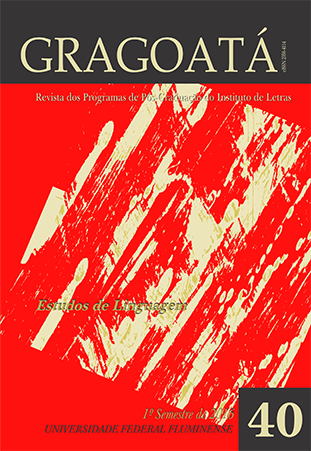THE CONSTRUCTION WITH VERBS OF COGNITION IN BRAZILIAN PORTUGUESE: A PRELIMINARY STUDY
DOI:
https://doi.org/10.22409/gragoata.v21i40.33383Keywords:
Argument structure. Cognition verbs. Usage-Based Functional LinguisticsAbstract
This paper presents a preliminary analysis about the argument structure with cognition verbs in Brazilian Portuguese. Data were collected in a sociolinguistic interview, whose informant is a 50 years old man that represents the speech of Natal/RN and the education level of elementary school. The results show that the prototypical construction of argument structure for the cognition verbs corresponds to a subschema of prototypical transitive construction and it is held in most constructs, which refer to more specific subschemas, depending of the linguistic item which assumes the function of direct object. The theoretical support adopted is the Usage-Based Functional Linguistics, which is a theoretical and methodological model, which follows principles, processes and categories of North American functional linguistics and cognitive linguistics.
Downloads
Downloads
Published
How to Cite
Issue
Section
License
Authors who publish in Gragoatá agree to the following terms:
The authors retain the rights and give the journal the right to the first publication, simultaneously subject to a Creative Commons license CC-BY-NC 4.0, which allows sharing by third parties with due mention to the author and the first publication by Gragoatá.
Authors may enter into additional and separate contractual arrangements for the non-exclusive distribution of the published version of the work (for example, posting it in an institutional repository or publishing it in a book), with recognition of its initial publication in Gragoatá.

Gragoatá is licensed under a Creative Commons - Attribution-NonCommercial 4.0 International.











